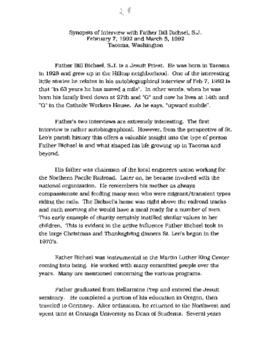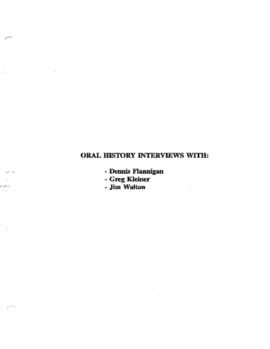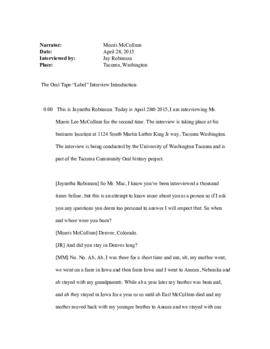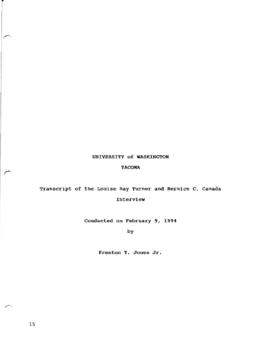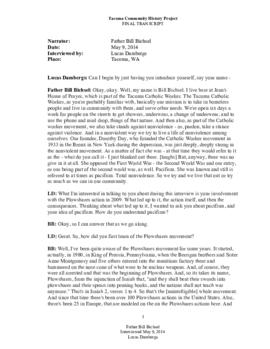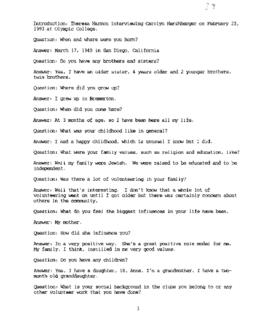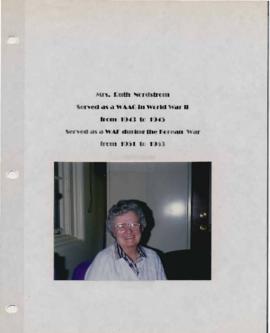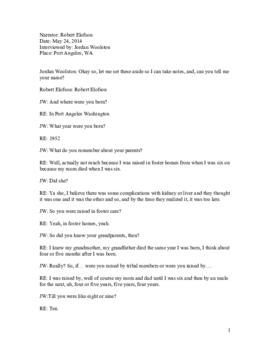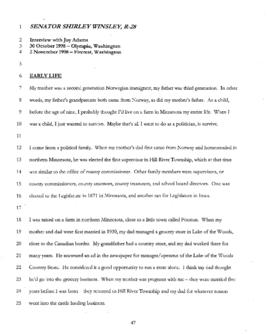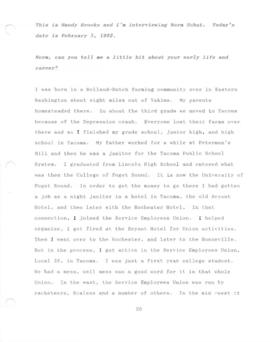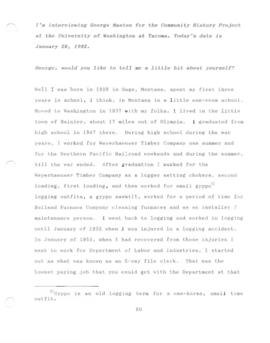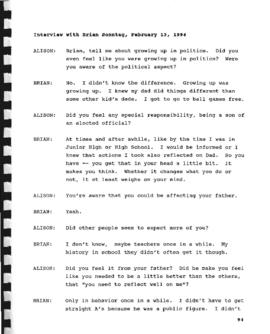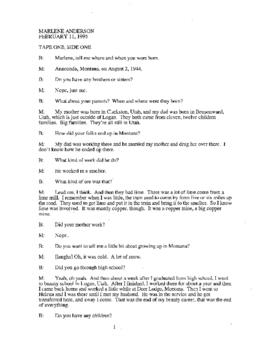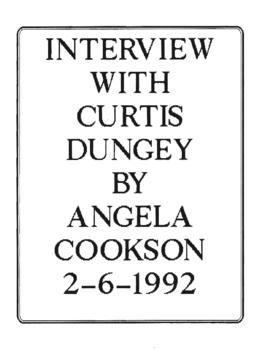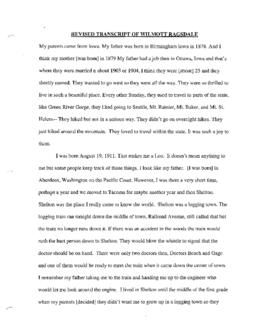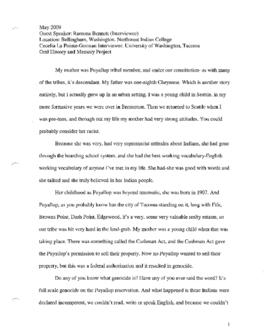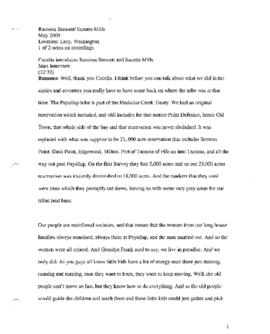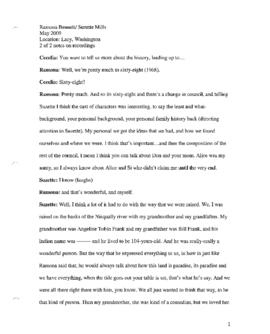Showing 230 results
Collections153 results with digital objects Show results with digital objects
- Series
St. Leo the Great Parish - Tacoma, Washington
- File
- 1992
Oral history interviews with Patricia Ditter, David Algers, Bill Bichsel, Doris Barkley, and Barbara Thomashofski by Cynthia A. Thomas conducted February-March 1992. Community members and church leaders reflect on the history and legacy of St. Leo Church, a Jesuit parish located in Tacomas Hilltop neighborhood. Long-time parishioners Patricia Ditter and Barbara Thomashofski and former parishioner Doris Barkley discuss the churchs growing pains in the wake of Vatican II and the subsequent emergence of its social justice ministry. Reverend David Alger, director of Associated Ministries, describes some of St. Leos numerous out-reach programs and shares his thoughts on its position as a spiritual anchor within the community. Lastly, Father Bill Bichsel, a former associate pastor at St. Leos and a well-known social activist, discusses his commitment to social justice and his involvement with several church-related projects, such as the Martin Luther King Center.
The Safe Streets Campaign: Tacoma and Pierce County Respond to Youth Violence
- File
- 1994
Oral history interviews with Dennis Flannigan, Greg Kleiner, and James L. Walton by Janice M. Foster conducted January-Febrary 1994. Pierce County Councilman Dennis Flannigan, Safe Streets program coordinator Greg Kleiner, and Deputy City Manager Jim Walton talk about their involvement with Tacomas Safe Streets Campaign. Interviewees discuss the programs short-term and long-term goals and describe some of the difficulties in organizing grassroots movements.
Morris McCollum: Tacoma's Hilltop Community Icon
- Item
- 2015
Oral history interview with Morris McCollum by Jaynetha Robinson conducted 04/28/2015. Mr. Morris McCollum, "Mr. Mac" as he affectionately known, is one of Tacoma's most respected business and community leaders. He is certainly one of the longest lasting. Shortly after arriving in Tacoma in 1957 Mr. McCollum purchased the K Street Department Store which was located on the corner of 12th and K. He operated the store for several years. At the time the K Street business sector, one of the city's twelve business districts, was second only to downtown Tacoma in terms of business activity. Businesses such as hardware stores, banks, small department stores, appliance dealers, butchers, markets, cleaners, clothing stores, and restaurants lined the streets. In 1960, he moved to 11th and Broadway and opened what to become the quintessential men's store "Mac the Knife," later shortened to "Mr. Mac's." At the time the Tacoma business district was being adversely affected by the building of the Tacoma Mall which would, after its completion, lure many of the surrounding businesses to it. Mr. Mac stayed, however, and became president of the K Street Booster Club, an organization dedicated to promoting the interests of small family owned businesses and the community that surrounded them. In addition to having an active interest in the business community Mr. McCollum also became dedicated to the areas youths and his interests in sports, boxing in particular, lead him to becoming involved with the Tacoma Athletic Commission, eventually becoming its president in 1978. Recognized by the city of Tacoma with the 2004 Martin Luther King Jr. award Mr. McCollum remains a leading figure.
African American Life in Tacoma
- Item
- 1994
Oral history interviews with Louise R. Turner and Bernice C. Canada by Preston T. Jones conducted 02/09/1994. Sisters and lifelong Tacoma residents Louise Turner and Bernice Canada share their family history and reflect on how the city's racial attitudes have changed during their lifetimes. They describe their experiences as African Americans growing up in turn-of-the-century Tacoma and comment on the rise of segregation during and after the World Wars. Turner and Canada also touch on their work as Eucharistic ministers. The interview concludes with their thoughts on the importance of family values.
Father Bill Bichsel and Disarm Now Plowshares
- Item
- 2014
Oral history interview with Bill Bichsel by Lucas Dambergs conducted 05/09/2014. Father Bill Bischel discusses his life as a Jesuit priest, as well as joining a tradition of radical Catholic non-violent activism. A particular focus is paid to his role in the Disarm Now Plowshares action where he, and four others, broke into the Bangor Trident nuclear submarine base near Bremerton, Washington, to symbolically disarm nuclear weapons stored there.
The Slavic Fishermen of the Puget Sound
- Item
- 1991
Oral history interviews with Nick and Rose Tarabochia by Penny M. Tennison conducted 05/29/1991. The joint interview with married couple, Nick and Rose Tarabochia, covers their family life and early struggles to earn a living and raise a family during the Depression. Among the topics discussed by Nick Tarabochia are: his childhood in Brookville, Washington, the life of a fisherman in the Pacific Northwest (including a consideration of purse seine fishing versus gill netting), and Native American fishing rights. Subjects covered by Rose Tarabochia include: her upbringing, her self-reliance as a fisherman's wife, and her real estate acumen.
The History of the Kitsap County Young Women's Christian Association
- File
- 1993
Oral history interviews with Lillian Allen Walker and Carolyn Hershberger by Theresa Harmon conducted 02/1993. Two longtime members of the Kitsap County YWCA share the history of their organization, tracing its evolution from a wartime social club to a community outreach task force. The Lillian Walker interview focuses on the organizations early years, as well as Walkers civil rights activities. The Carolyn Hershberger interview covers the establishment of the ALIVE (Alternatives to Living In a Violent Environment) program and its merger with the Kitsap YWCA in the late 1970s.
- Series
Robert Elofson: The Lower Elwha Klallam and the Return of Their River
- Item
- 2014
Oral history interview with Robert Elofson by Jordan Woolston conducted 05/24/2014. Robert Elofson discusses his early life being raised outside the Lower Elwa KlallamTribe in foster homes, his college years earning a double bachelors degree in physics and biology at Western Washington University and his involvement in the Western Washington Native American Student Union. This led to him being the first fisheries biologist for the Lower Elwah and his involvement in the Elwha dam removal and restoration of the Elwha river ecosystem. The original sound recording of the interview is not included.
Then and Now: Women Legislators in Washington State
- File
- 1998
Oral history interviews with Shirley J. Winsley and Lorraine Wojahn by Joy Adams conducted October-November 1998. Washington State Senators Shirley Winsley and Lorraine Wojahn discuss their decade-spanning political careers and comment on trends and shifts in American politics.
Farming in the Time of Pandemic
- File
- 2020
Oral history interviews with Kevin Jensen, Ann Petricola, and Joel Baranick by Nora White conducted 05/01/2020. This project is based off of oral interviews, recorded and transcribed, with Thurston County farmers: Ann Petricola and Joel Baranick of Ellis Creek Farm and Kevin Jensen of Riverbend Ranch. The research essay explores the immediate trends seen in small farms during the first four months of the COVID-19 pandemic in Spring 2020. In a time of great uncertainty and fear, small farms across the US suddenly saw a spike in interest for direct to consumer sales while also facing processing bottlenecks and financial uncertainty. The experiences of Ellis Creek Farm and Riverbend Ranch paint a picture of small farms as safe, flexible, and community oriented sources of food and highlight some of the specific challenges they have faced during this time.
The History of Council 28: The Washington Federation of State Employees
- File
- 1992
Oral history interviews with Norm Schut, George D. Masten, Howard Jorgenson, Gary Moore, and Esther Stohl by Randy Brooks conducted January-February 1992. Union leaders and activists, Norm Schut, George Masten, Howard Jorgenson, Gary Moore and Esther Stohl discuss their early lives, how they came to be involved with organizing, and their roles in the development of the WFSE local in Washington State.
History of the Tacoma Smelter and Its Workers
- Item
- 1992
Oral history interviews with Curtis Dungey and Chuck O'Donahue by Angela Cookson conducted 02/1992. The interviews with both Curtis Dungey and Chuck O'Donahue discuss their association with the Tacoma Smelter and ASARCO. O'Donahue, who worked at the plant for over twenty years (1963-1985), also was active as a union leader for Local 25. Dungey was the senior environmental scientist for ASARCO who oversaw the closure of the plant.
- Series
The Chronicles of the Life of Wilmott Ragsdale
- Item
- 2007
Oral history interview with Wilmott Ragsdale by Alicia J. Carter conducted April-September 2007. Wilmott Ragsdale presents his life story and gives an overview of his decade-spanning journalism and teaching careers. Notable highlights from this lengthy collection of interviews include: Ragsdale's childhood in Tacoma's early Proctor District; his time as a war correspondent in England during World War II; his opposition to the Canwell Committee and subsequent involvement with the academic freedom movement; and his travels to South America, Europe, the Middle East, and Africa.
